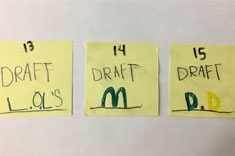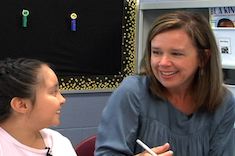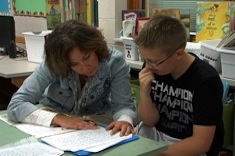I met a stranger one morning. I guess all people are strangers until you meet them. Nancy, the stranger I met, was riding her bike as my dog was on a break from his walk. Bo was spread out so that he had a maximum cool-grass-to-belly ratio. He’d extended his legs both ways, and his tongue was out of his mouth as he panted. He was too hot from the summer humidity to walk any farther until he cooled down.
Nancy and I exchanged good mornings as she rode past on her bike. Then she decided to turn her bike around and ask to interview me. Nancy, it turns out, is a writer. More specifically, Nancy is a poet. She is working on several projects, one of which is a new passion project where she interviews 30 strangers with the same set of questions and turns the words into a poem.
After the break was over, Bo and I resumed our walk back home. I turned off my podcast and pulled my headphones out, because I was thinking about my encounter with Nancy the poet. I thought about her writing life that she continued to live, even on her bike.
After Nancy asked if she could interview me for her poetry project, she pulled a list of questions and a pen out of the front basket of her bike. She had her project on her mind and was prepared to work on it, even as she enjoyed a summer bike ride. This is the writerly life I encourage the students I teach to live as well. I ask them to grab their notebooks and write about small moments that happen at recess, funny stories about themselves and their friends, quotes from books they read. I want them to live like Nancy, working on a project that excites them.
Choice in Writing
One way to help students find their passion is through choice in writing. When teaching a new genre of writing, getting kids excited about their writing includes letting them choose what they want to write about. Choice in writing on their device or on the multiple kinds of paper I provide is another way students can get excited about their project and write like Nancy. Working from a to-do list of what students need to accomplish is another way to add choice to their work. The list contains many of the minilesson strategies that have been taught. This list guides the writer to work on skills that are important to meet grade-level standards or aspects of the genre we are learning about, but that work doesn’t always need to be done the same day I have taught them.
Making Connections with Other Writers
As Nancy and I talked about her project and other ways she writes, she invited me to a writing group that she is working with for a community event. This connection I made with Nancy is another goal I work to implement with my students. I create writing partnerships who help each other with the writing process of our unit of study, work to help each other edit, and celebrate the work they have completed. Connections remain an important part of our workshop, from the launch of a new unit to the celebration at the end when we share our finished pieces. These connections help when I can’t confer with a writer that day, continuing to move the writer.
Celebrating Our Writing
Being part of a workshop creates time and space to celebrate the work each writer completes. We often have mini-celebrations as I move from the first part of the unit where I model the work we will do together through the next few weeks of lessons. We celebrate again when we have finished the part of the unit where the writers are supported with an opportunity to write a piece together. We celebrate again at the end of the unit, when students have gone off on their own to write their own piece. We celebrate with writing partners often—sharing our best lead we tried in our notebooks, celebrating how we tried out a new convention, celebrating the volume of writing we completed. Celebrating the small parts of our work before we ever get to the final piece helps each writer feel successful along the way.
I hope I see Nancy in our neighborhood again to see how her work with strangers became a poem. I have been thinking more about the community project Nancy invited me to participate in and am thinking about whether it might be a good fit for me. I hope to share how Nancy lives her writerly life with my students, letting them know that writing can be a part of your life all day, every day. I hope my students write like Nancy.










